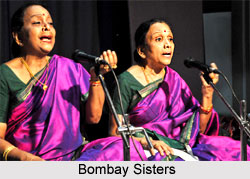 Bombay Sisters, C. Lalitha and C. Saroja, are Carnatic music vocalists. They started their professional career in 1963. Since then they have ornamented in all most all the occasions and sabhas in India. They have also performed in the All India Radio`s national programmes, in Doordarshan and other private satellite channels. They have also fetched the honour of being the Top Grade Artists of the All India Radio. Bombay Sisters bagged the eminence of recording the maximum number of audiocassettes recorded for respective companies on an assortment of themes in Telugu, Tamil, Malayalam, Sanskrit and Kannada. As recognition to the expertise of the sisters, the National Sangeet Natak Academy, New Delhi, conferred them the opportunity to do research and traditional and folk marriage songs for their repositories. Their research works later on were taped in audiocassettes for the welfare of Tamil scholars and music lovers.
Bombay Sisters, C. Lalitha and C. Saroja, are Carnatic music vocalists. They started their professional career in 1963. Since then they have ornamented in all most all the occasions and sabhas in India. They have also performed in the All India Radio`s national programmes, in Doordarshan and other private satellite channels. They have also fetched the honour of being the Top Grade Artists of the All India Radio. Bombay Sisters bagged the eminence of recording the maximum number of audiocassettes recorded for respective companies on an assortment of themes in Telugu, Tamil, Malayalam, Sanskrit and Kannada. As recognition to the expertise of the sisters, the National Sangeet Natak Academy, New Delhi, conferred them the opportunity to do research and traditional and folk marriage songs for their repositories. Their research works later on were taped in audiocassettes for the welfare of Tamil scholars and music lovers.
Early Life of Bombay Sisters
C Saroja and C Lalitha, the Bombay Sisters, was born in Trissur, Kerala. They both were raised in Bombay (now Mumbai). They were inducted to the world of music with the hands of their elder sister. Then onwards they received training from Sri H A S Mani, also known as Chellamani Bhagavathar. As their father also serves as the active member of many Sabhas, they used to go to that Kutcheris (concerts) of top artistes like M S Subbulakshmi, D K Pattamal, M L Vasantha kumari. These maestros later on played a significant role in their life, as they became their source of inspiration.
After achieving the All India Scholarship in music, C Saroja shifted to Chennai to pursue the scholarship. She spent 2 years at the Government Music College at Chennai with this scholarship. One year later C Lalitha also joined there. During that time they came to contact with Mussiri Subramania Iyer, who was the principal of the Government Music College. She advised them to pursue further training in music. As a result they went to Sri Govinda Rao, who has played an important role in shaping their music career.
Career of Bombay Sisters
During the year 1962-1963, at a Sai Baba Temple Kutcheri, they have been allotted junior slot for a concert and that became momentum for them. At that concert they got a chance to sing at the slot that was allotted for maestro Madurai Mani Iyer. Their journey towards a successful career was geared up since then. The Bombay Sisters
Other activities of Bombay Sisters
They sing in multiple languages like Kannada, Sanskrit, Tamil, Telugu, Hindi, Malayalam and Marathi. Both C. Lalitha and C. Saroja are also known for promoting young musicians through endowments and scholarships. As the sister duo have underwent a lot of struggle in their early career, they have established a trust after their parents, the Mukthambaram Trust. The main aim of this trust is to promote deserving young talent and to foster, nourish and give proper exposure to young artistes in the field of Carnatic music, thus enabling the youth to carry forward the torch of traditional culture into the 20th century.




















